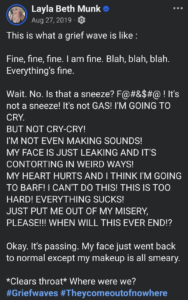Grief waves sure are tricky little suckers.
They really can sneak up on you out of the blue, sometimes out of absolutely nowhere.
It’s been a while since one has taken me out at the knees, but I don’t expect that they’re gone for good. No, as long as we still feel the loss of someone near and dear (or even multiple loved ones; people as well as pets), we are subject to the random Grief Wave attack.
Early on, I shared my description of Grief Waves on Facebook:
For me, that’s exactly how they are. One minute, I’m fine. Next, something has hold of my face as well as my heart, and I feel like the room is spinning and the Earth is trying to toss me into orbit.
But it passes.
It always does.
Sometimes, when they’re over, I try to analyze them. I might even find humor in the fact that a random, powerful surge of emotions can actually overpower me, a grown, human adult.
I’ve tried to fight them off, but I can’t. If one such wave is going to hit, I’d best let it hit.
So I’ve learned to just ride them out, then repair any surface damage – waterproof mascara is a Godsend, and a little concealer can work post-Grief Wave wonders.
It’s also okay to not repair the surface damage. We don’t have to be ashamed of our grief. It’s a natural feeling for the bereaved, even many years out.
We are not broken because we experience an arbitrary wave of grief. It means we deeply love someone who is no longer here, and every so often, our hearts remind us of the pain of this loss.
Time truly helps to heal this pain; it does get better. But a Grief Wave might hit at any given time. As fast as they come in, though, they also go back out, so they are nothing to really worry about.
I try to imagine them as a trip to the beach, when a big, cold wave hits me higher than I expected it to. But then, afterward, I go and sit in the sun and everything is alright once more.
Image via BingAI



